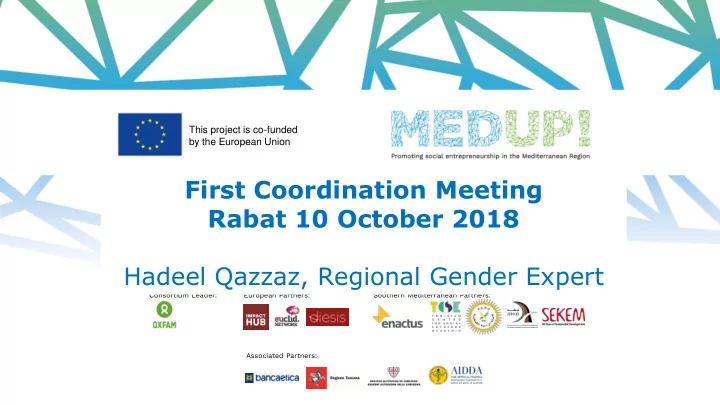

This project is co-funded by the European Union First Coordination Meeting Rabat 10 October 2018 Hadeel Qazzaz, Regional Gender Expert Consortium Leader: European Partners: Southern Mediterranean Partners: Associated Partners:
This project is co-funded by the European Union
Why a Gender Approach? ● A gender approach looks at the gaps men and women of different ages, economic situation, ethnic, class and level of education, face. ● In the MENA region women entrepreneurs face many gender-specific obstacles to business development ranging from access to finance to business registration and freedom of movement. ● Women’s labour force participation in MENA is the lowest in the world, and unemployment is highest. This project is co-funded by the European Union
Project Vision Young people and women find employment with decent jobs in MENA countries. This project is co-funded by the European Union
What is our Approach? ● Gender mainstreaming ○ Identify barriers to women entrepreneurship at country level (in the framework of Country Studies) ○ Specific indicators to monitor Women Economic Empowerment ○ Making sure that gender segregated data is gathered across the project ● Advocacy and influencing ○ Regional Gender Study: compare results from barrier analysis at country level, and produce practical recommendations ○ Advocacy campaign based on recommendations provided by the Regional Study This project is co-funded by the European Union
Why a Gendered Approach? ● There is a wide pay gap between women and men, particularly in the private sector. ● Women have difficulty accessing senior management positions both in the public and the private sector. ● Women’s entrepreneurship lags far behind that of men, and when women do create firms, they are often micro-enterprises active in consumer-oriented sectors. ● Women are more often entrepreneurs out of necessity rather than opportunity. This project is co-funded by the European Union
A gender blind approach does not work? ● Men and women face the same conditions in registering a business. Yet in practice, women face additional challenges in business registration and licensing procedures. ● Access to finance is in principle equal. However, different factors – such as unequal inheritance laws and bank requirements that expect husbands to co-sign loans – contribute to women having less available collateral to secure external financing than men. This project is co-funded by the European Union
Selected indicators as per the logframe ○ No. of jobs created (disaggregated by gender, age and rural/urban location) ○ No. / % of women social entrepreneurs in targeted firms ○ No. of young people and women who engage in activities (debate/ training/projects etc.) related to social entrepreneurship ○ No. of people from targeted SEs trained in financial and technical tools for SEs (disaggregated by age, gender and location rural/urban) ○ No. of success stories identified and disseminated This project is co-funded by the European Union
Arab states occupy the lowest rank of Gender equality. This project is co-funded by the European Union
This project is co-funded by the European Union
Recommend
More recommend